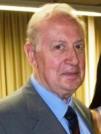Ramon Segura Cardona, retired professor of the University of Barcelona (UB) and formerly of the Autonomous University of Barcelona (UAB) left us on 12 July. Known to so many students and disciples, “Dr Segura” a native of Segarra, studied Medicine at UB, and completed his degree in 1960. From the beginning of his career he showed an interest in Physiology and a love for teaching and research, and was Assistant Chair to Professor Vidal Sevilla. He obtained his doctorate in 1962 from the University of Seville, where he started as an interim professor of Physiology. After a return course at the UB, he made a stay in Germany, with a prestigious grant from the Von Humboldt Foundation, and another in England. In 1967, he returned to the UB after winning an adjunct professorship by competitive examination. In 1968, he published his book “Nociones de Físico-Química” (Fundamentals of Physicochemistry), an authentic work of art allowing an understanding of concepts considered very dry by medical students.
Attracted by the greater possibilities of research and encouraged by another illustrious native of Lleida, Joan Oro, he left for the United States and obtained an Assistant Professorship at Baylor College, Houston. That was where, in the Department of Medicine under Antonio M Gotta, he shaped his main line of research on alterations in lipid metabolism; he was a pioneer in an era of predominance of scientific advances on proteins. His knowledge of physicochemistry also led to his making outstanding innovations in chromatographic separation methods, among the most cited papers in this field.
Ramon Segura returned to Barcelona in 1975, first as an adjunct professor and then as Professor of the then incipient Department of Physiology in the Faculty of Medicine of the UAB. He was a driving force behind the construction of the new building of the Faculty of Medicine on the Bellaterra campus, inaugurated in 1977. There he generated his first school of disciples and fully practiced teaching and research. Yet he also had time to devote himself to university management, as, among other positions, Vice-Chancellor of Centres with the first democratically elected Rector, Professor Josep Laporte.
In 1986, Ramon Segura qualified for the Chair of Physiology of the Faculty of Medicine of UB, a return to the institution from which he started. At UB he was in charge of teaching physiology at the Bellvitge Campus, leaving his mark in terms of teaching quality, as evidenced by the fact that he was repeatedly chosen as godfather of the graduating class. He published his manual “Prácticas de Fisiología” (Practices of Physiology), which reflects his enormous interest and forward-looking vision on the need for practical learning in this discipline and in medicine in general. For more than 20 years, in the Department of Physiological Sciences of the Bellvitge Campus he developed a line of research on the physiology and pathophysiology of physical exercise, metabolism and the influence of nutritional supplements. Along these lines, not only did he contribute in innovating concepts and knowledge applicable to health and disease, but he also advanced new strategies for improving physical performance, which even led him to become a scientific advisor to elite athletes.
Through his career he published more than 150 scientific articles, participated in several books and directed more than 20 doctoral theses. Also, from this lengthy university career, Dr Segura has left an immense amount of students and disciples, colleagues and friends, to whom he always devoted his attention, fairness and best advice. His contribution from the university was always guided by seeking to improve the training of future medical professionals, to promote the quality of science and the wellbeing of society. His passion and motivation for teaching made him one of the few teachers that students will remember all their lives. His dedication to the university and the medical profession was always exemplary. In the research laboratory, he showed his incredible ability to surprise his disciples every week with new ideas and projects. He achieved all of this while maintaining wonderful care and attention for his family, his friends and those around him.
His last publication was in the most recent edition of the journal Apunts. Medicina de l’esport.1 It seems that with this publication Dr Segura wanted to return home after a full professional life, surrounded by some of his disciples and friends.
For all of these reasons, Dr Segura will always remain in our memories and this brief tribute provides testament to this.








